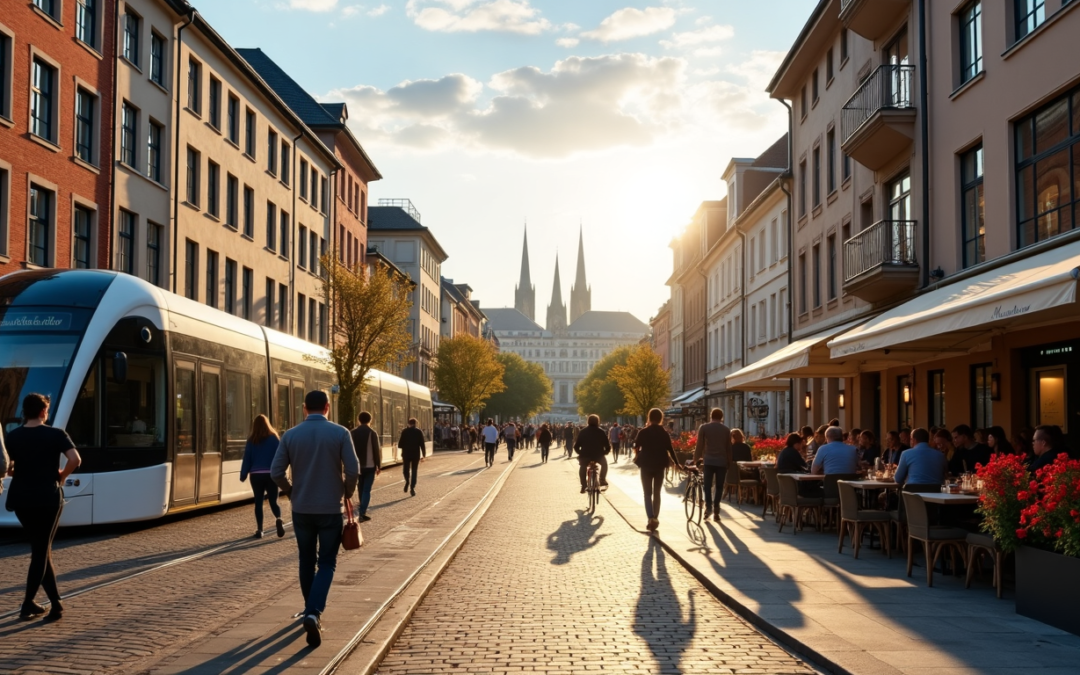Germany ranks among the top 10 countries worldwide quality of life, and people often ask if they should make the move.
The country gives you plenty of good reasons to call it home. A resilient social security system, top-notch healthcare, and education make Germany stand out as a prime destination for newcomers.
The German lifestyle blends economic stability with practical perks that help foreigners settle easily. The strong job market, complete healthcare system, and quick public transport draw people’s attention. This piece highlights the factors that make Germany a top pick for immigrants and shows what your new life there might look like.
Understanding Germany’s Immigration-Friendly Policies
Germany welcomes qualified professionals with open arms thanks to its recent immigration policy changes. The country has optimized its immigration process, making life easier for skilled workers and their families.
Overview of immigration laws and benefits
The country’s updated immigration laws help new arrivals while meeting economic needs. Since March 2020, the Skilled Immigration Act has made moving to Germany easier for qualified professionals. You’ll love these benefits:
- Fast-track residency options
- Simple visa applications for skilled workers
- A chance to bring family members
- Access to integration support services
Fast-track residency programs
The new processes will speed up your waiting times by a lot. Skilled workers can get their visa within three weeks after completing their application. Highly qualified professionals can turn their temporary residence permit into permanent residence in just three years.
Support systems for new immigrants
Germany helps you blend into your new life with complete support. Young newcomers up to age 27 can get free help from Youth Migration Services. They’ll guide you through everything – from finding a place to live to planning your career. You can access information in multiple languages through Handbook Germany, which covers more than 150 important topics in nine languages.
The German Red Cross runs over 490 accommodation centers. They are a great way to get language classes, job training, and medical care. The Migration Advisory Services network has more than 700 centers across Germany. These centers help you with daily needs like housing, healthcare, and family matters.
Economic Advantages for Newcomers
Life in Germany comes with a resilient job market that creates amazing opportunities. The country leads the EU with its largest labor market, employing over 45 million workers. The working-age population enjoys a steady employment rate of 77%.
Job market opportunities and security
Jobs of all types are available in these thriving sectors:
- Healthcare and medical technology
- Information technology and engineering
- Scientific disciplines and STEM fields
- Skilled trades and craftsmanship
Skilled workers are in high demand. The country faced a shortage of 381,000 skilled workers in 2022, and this number could reach 2.4 million by 2035.
Cost of living vs. earning potential
German salaries are attractive, with average annual earnings of USD 53,754 – higher than the OECD average of USD 49,165. Living costs change based on location. A single person needs about €992 monthly for simple expenses, not counting rent. Munich ranks as the most expensive city, while places like Leipzig and Dresden are easier on your wallet.
Social security benefits and healthcare
Germany’s detailed social security system provides excellent financial stability. The risk of income loss from unemployment sits at just 1.4%, which is much lower than the OECD’s 5.1% average. Healthcare coverage is a must and covers most needs. About 86% of people use statutory health insurance that pays for inpatient, outpatient, mental health, and prescription medications. Employers and employees share the costs, usually totaling 14.6% of gross wages.
Practical Benefits of German Infrastructure
Germany offers some of Europe’s most reliable infrastructure systems. The country’s well-laid-out facilities help newcomers adjust to daily life quickly.
Public transportation and mobility
Germany’s vast public transport network lets you travel across the country with the “Deutschland-Ticket” at just €49 monthly. Busses, underground trains, S-Bahn trains, and trams blend naturally into one system. Most cities don’t require a car because 95% of locations are available by public transportation.
Housing options and support
You’ll find many housing choices in Germany that fit your needs. Here are your options:
- Shared flats (WG) where you share common areas
- Short-term places while you get settled
- Social housing if you have limited income
- Barrier-free apartments that work for people with disabilities
A certificate of eligibility (WBS) helps you qualify for social housing and gives you access to cheaper state-subsidized apartments. You might want to start with furnished places while you look for your permanent home.
Education system accessibility
The German education system shows its steadfast dedication to including everyone. 95% of refugee children aged 10-17 go to school, which shows how well the system helps newcomers fit in. German law makes sure refugee children can learn just like local students.
Schools help you adjust with programs such as:
- Resources to learn the language
- Programs about German culture
- Special classes for newcomers
Students get full-day learning opportunities, though some primary schools run half days. Older students can pick from different educational paths that match their goals.
Essential Support Systems for Integration
Success in your new German life starts with the country’s detailed integration support systems. A well-laid-out network of services helps you adapt and thrive in your new home.
Language learning resources
German language skills open doors to a successful life in Germany, and support for this trip surrounds you. The country provides official integration courses that combine language and orientation, with 600 hours of language training and 100 hours of orientation lessons. These courses teach you:
- Work and career communication
- Daily life interactions
- Administrative procedures
- Job interview preparation
More than 1,600 local language schools offer government-funded courses. Parents who work can access childcare during classes, which makes it easier to keep taking them.
Cultural orientation programs
Orientation courses give you deep insights into German society. They teach you about Germany’s legal system, culture, and values while you build community connections. The Federal Government believes integration works as a two-way process – you need to be willing to learn and locals need to welcome you.
These programs help you feel at home quickly by covering everything in German life from Germany’s democratic order to its welfare system and religious freedom. Women, parents, and young adults can join special integration courses tailored to their needs.
Administrative assistance services
Dedicated support services provide practical help with administrative matters. Migration Advisory Services run more than 700 centers throughout Germany that are a great way to get guidance on housing, healthcare, and more. The Family Assistance Program (FAP) supports families with:
- Visa application processes
- Document compilation
- Travel preparations
- Reunification procedures
Your employer can help with insurance registration for the five mandatory types: health, long-term care, pension, accident, and unemployment insurance. They also assist with childcare options and explain the education system to make your transition easier.

